If you want to know, what does an ionizer do then you have come to the right place. Ionizer air purifiers are in demand more than ever before. Many people are purchasing it to improve indoor air quality but they do not know how it operates, and if it is suitable for your home or not.
Join me as I explain everything you need to know about them! Here we go!
Quick Answer
Regular ionizers are different from traditional air purifiers which use HEPA filters to trap pieces. An ionizer improves air quality with the help of charged particles that adhere to pollutants:
- This process reduces harmful contaminant concentration in the surrounding space.
- As they are no longer in the air, it becomes cleaner and easy to inhale.
- Also, ionizer removes different odors and smells.
But this appliance has both upsides and downsides. Keep reading to learn more about them, as well as the process and important things to look out for before you buy one!
Read Also: Clarifion Air Ionizer How to Clean It and Maintaince
What Does An Ionizer Do and How Does it Work?
Negative ions-based air cleaners release charged particles that fuse themselves to airborne irritants. This could include:
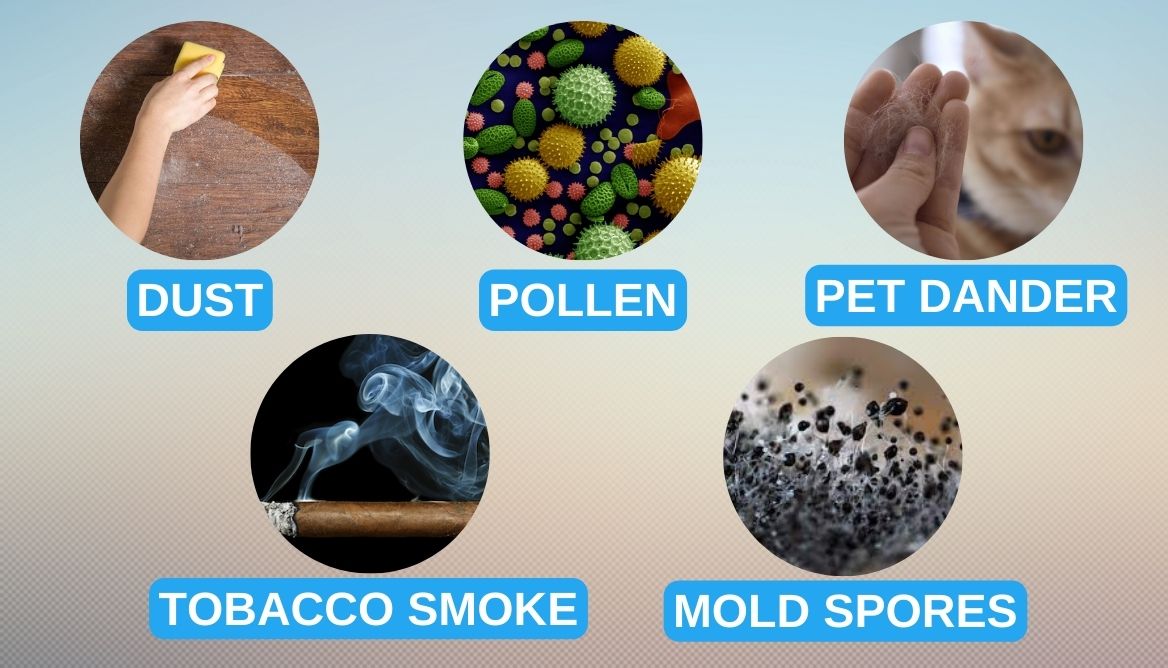
- Dust,
- Tobacco smoke,
- Mold spores,
- Pet dander, and
- Pollen.
The fusion causes them to either stick on the walls or fall on the surface. Meaning that they no longer remain in the air.
However, you must know that the ionic breeze may emit ozone gas. Learn about ionizers and their function in more detail in this video.
Are Ionizers Able to Kill Bacteria and Viruses?
Ionizers can certainly inactivate viruses and help reduce their presence. The Ozone produced by the appliance attacks the genetic makeup of a virus. However, they do not exactly kill them:
- It was proven by a study in 2018 that was further supported by another research in 2020.
- The latest analysis suggests Ozone can take down Covid-19, however, it is not known if the air ionizer gas is able to do it.
- Like other particles negative ions attach to the lung irritant and cause them to fall on the floor.
- Hence the Ion air purifying device will clear the air for you to fully breathe in and make it virus free.
What are the Advantages of Ionizer Air Purifiers
Here are the potential benefits one should opt for negative ions air cleaners. Let’s have a look below.
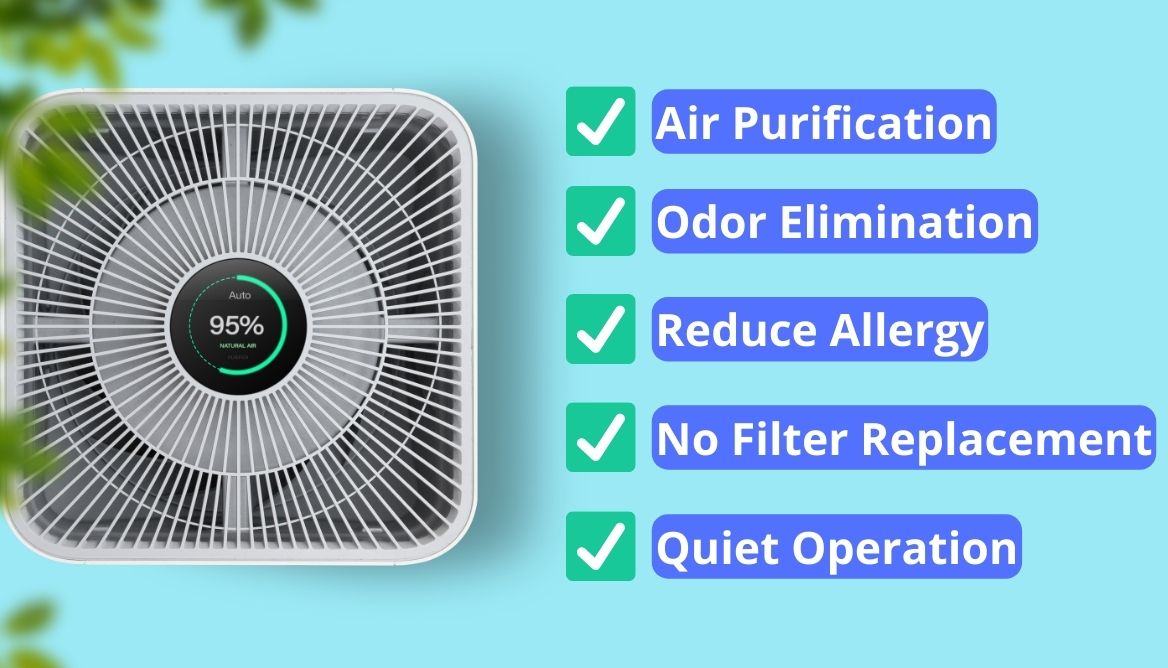
- Air Purification: Ionizers remove airborne pollutants, making the air cleaner and fresher.
- Odor Elimination: Negative air ions tone down unpleasant smells that can come from cooking, pets, cigarette smoke, and more.
- Reduce Allergy Symptoms: By using a negative ion generator you can decrease respiratory problems caused by airborne particles such as dust, and microorganisms.
- No Filter Replacement: Unlike traditional air purifiers, ionizers do not have HEPA filters. This makes maintenance and upkeep easy and less costly.
- Quiet Operation: Without-fan ionizer is noise-less. This is essential because if one needs undisturbed sleep, lounge or work in peace.
What Are The Disadvantages of Ionizers?
Following are the downsides one should know:
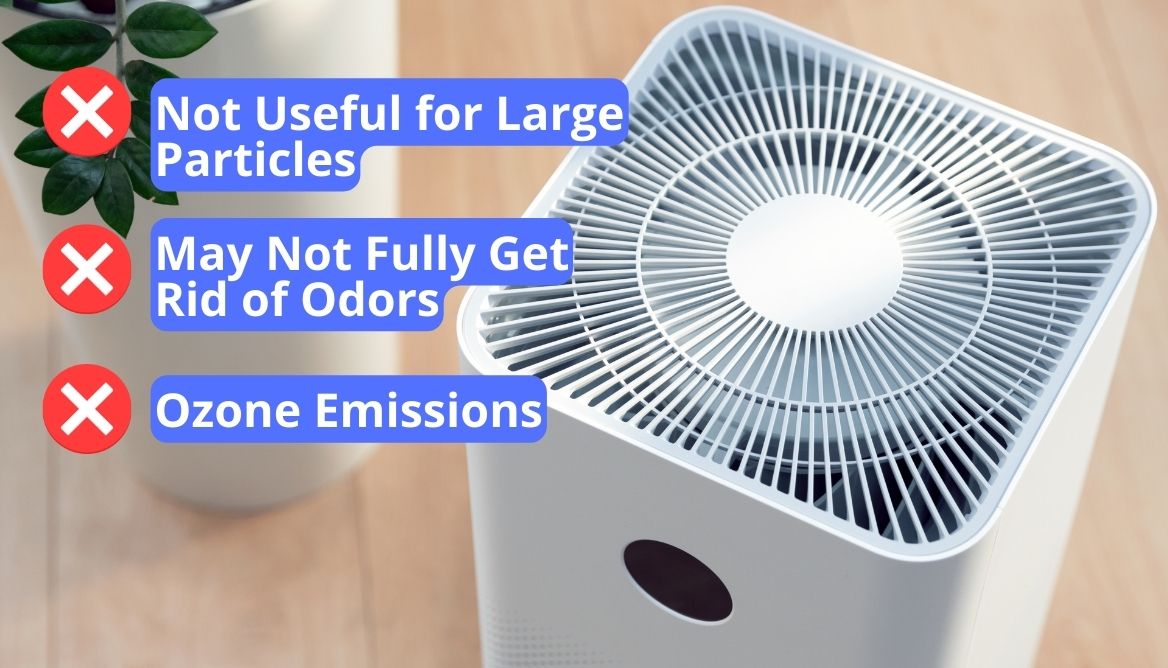
- Not Useful for Large Particles: The negative ions are not very good at taking down clumpy dust or fur. If you are allergic to these then an ionizer air purifier might not be best for you.
- May Not Fully Get Rid of Odors: Air ions will definitely help lower the intensity of unwanted smells and Volatile Organic Compounds. However, do not expect it to completely wipe it out.
- Ozone Emissions: They use ozone generators which can be problematic to human health. Always purchase ones that release a negligible amount of ozone (Below 50 ppb). Read this for more details to learn about harmful numbers.
What is the Various Kind of Ionizers?
Air ionizers have various types. You need to look for ones that can clear the airborne particles. Let’s find out which one is best suited for your home.
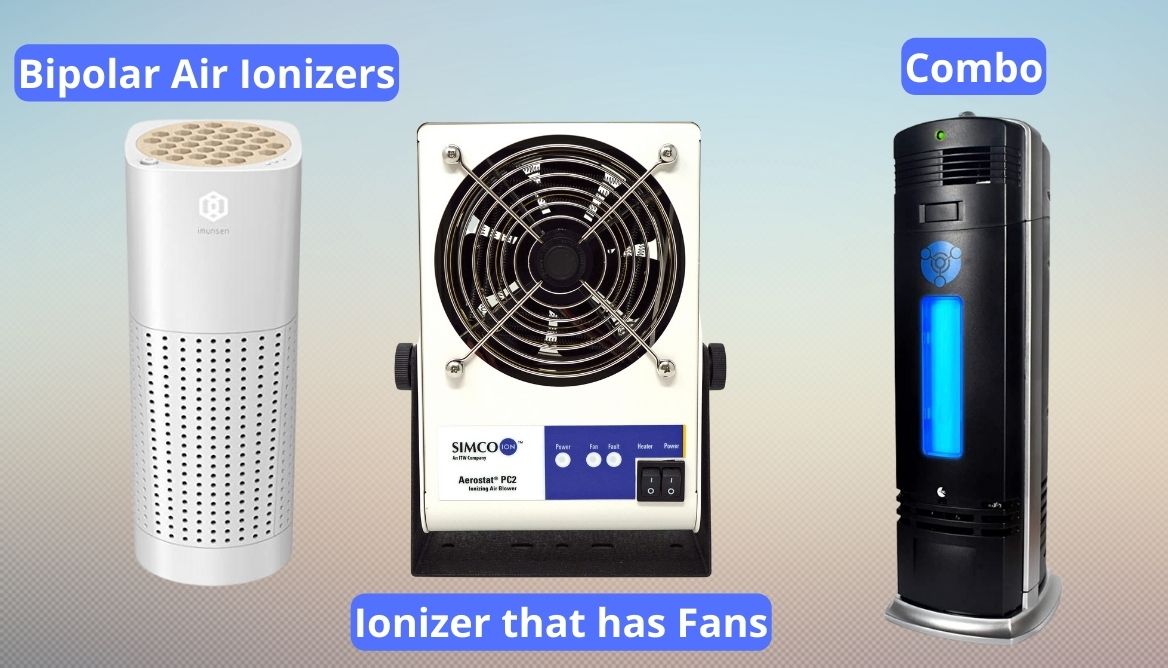
1. Bipolar Air Ionizers
Learn how a bipolar air ionizer works in order to know the difference between this and other types:
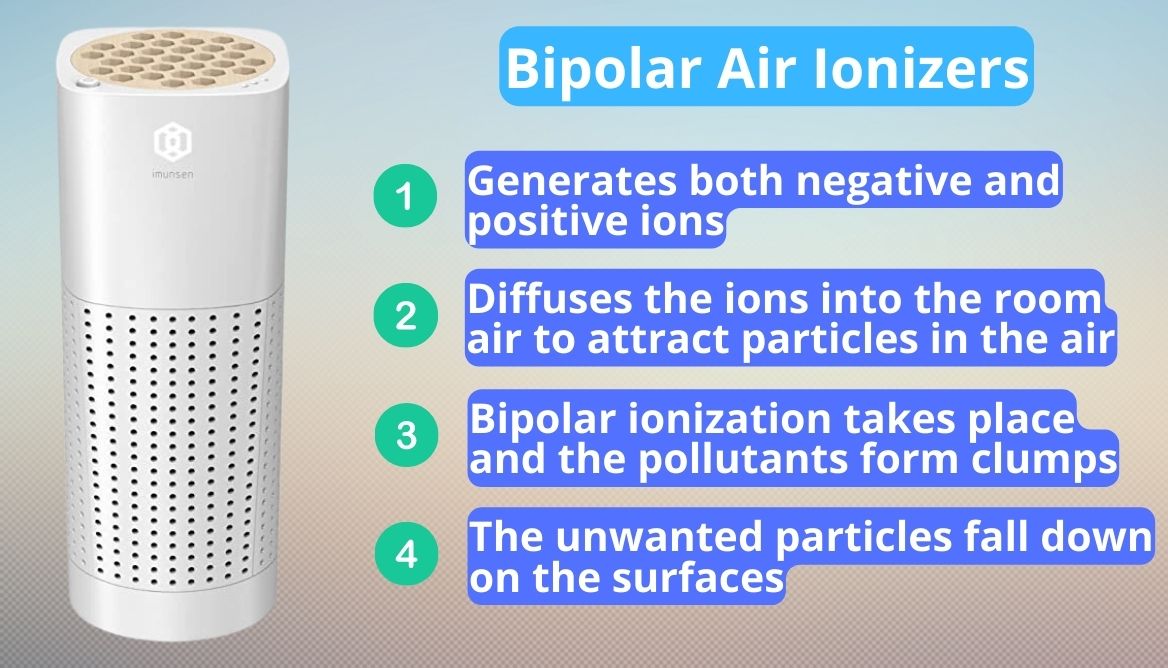
- It generates both negative and positive ions by applying an electrical charge to the air molecules.
- It then diffuses the ions into the room air to attract particles in the air.
- Bipolar ionization takes place and the pollutants form clumps. They are too heavy to stay floating in the air.
- The unwanted particles fall down on the surfaces which you can wipe clean or vacuum later.
2. Ionizer that has Fans
Now let’s find out what steps an Ion air purifier with a fan takes to clean air.
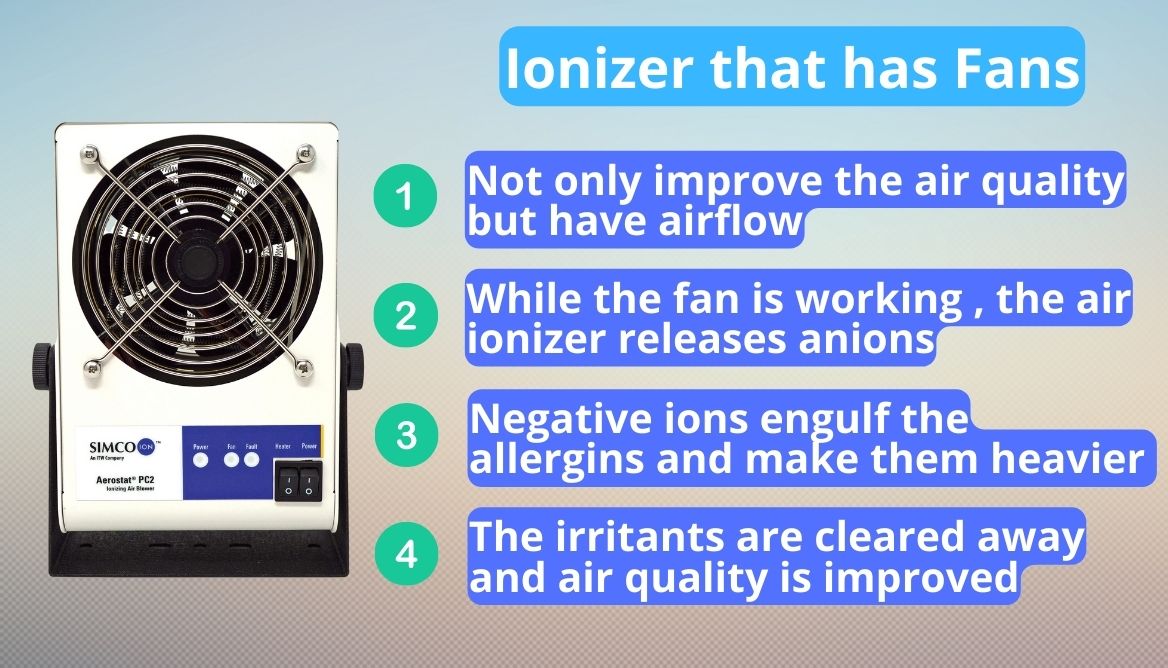
- It spins the fans that circulate air like traditional ones. Meaning you not only improve the air quality but have airflow.
- While the fan is working to increase gentle breeze, the air ionizer also releases negatively charged ions to catch airborne pollutants.
- Like other air ionizers, the negative ions engulf the allergins and make them heavier so they fall on the floor.
- The irritants are cleared away and air quality is improved.
3. Air Purifier and Ionizer Combo
Now let’s dive into the last type on my list. Here is how an Air Purifier and Ionizer combined cleans air:
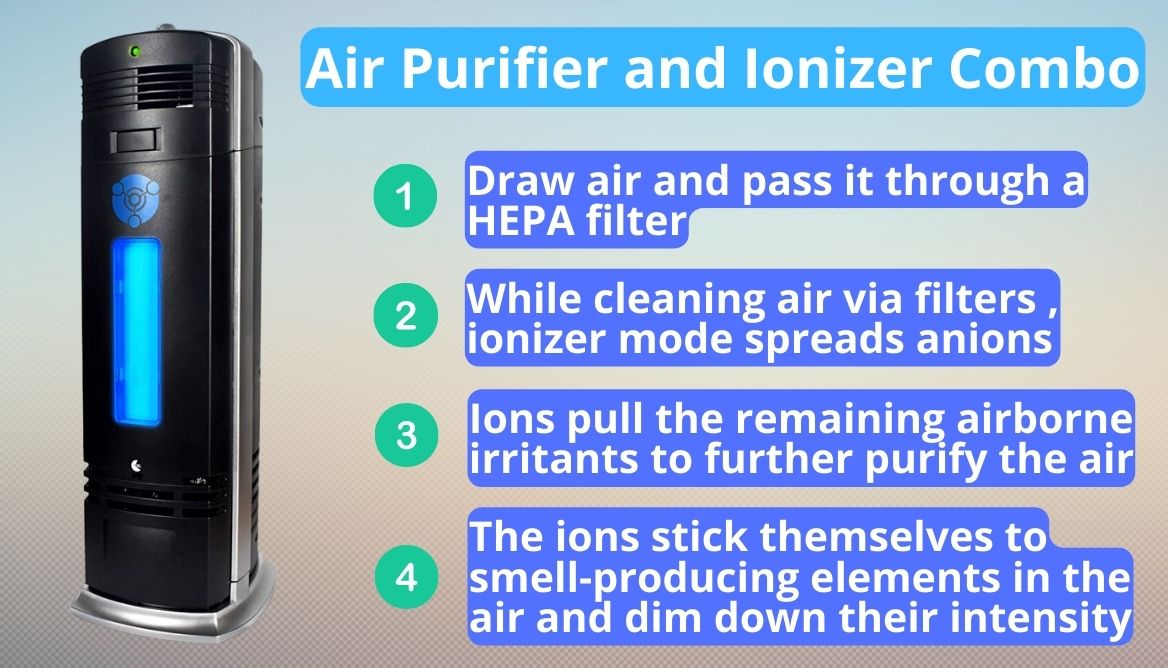
- As they are ultimately air purifiers, they draw the room’s air and pass it through a HEPA filter.
- While the air cleaning via filters takes place, with the help of ionizer mode negative ions are spread in the room.
- Ions work their magic and pull the remaining airborne irritants to further purify the air.
- The ions also stick themselves to smell-producing elements in the air. This dims down their intensity and makes the room pleasant to breathe in.
Ionizers and Air Purifiers Refer to the Same Appliance?
These are not the same appliances. Here is how they differ:
- Ionizers work by releasing negative ions into the air. Air Purifiers suck the surrounding air of the room inside it.
- An ionizer reduces the concentration of particles in the air while a purifier catches the smallest particles and traps them in filters.
- The ionizer would have better area coverage than an air purifier.
- The air purifier is usually better at capturing particles and odors.
- Ionizers require less maintenance and are more energy efficient than air purifiers.
You now briefly know how the appliances are different from each other. Also you can read my article where I talk about the dissimilarity in depth. This video has additional insights on the subject so do check it out as well.
How to Know if an Air Ionizer is Suitable for You?
Let’s have a final sneak peek into Ionizer to see if it is worth it:
- Determine your air quality concerns. Opt for an ionizer if it will be enough to help your allergy or respiratory conditions.
- Check your sensitivity to negative ions. If you do not have tolerance for it then do not go for an ionizer.
- Consider the room size and coverage area. The appliance cleaning capability must match it.
- Check the ionizer’s ozone production and environmental protection agency safety standards. Only buy ones that produce the gas in an ignorable amount.
- Assess if you will be able to perform maintenance regularly. Ionizer demands less than an air purifier.
- Evaluate if the noise levels are a concern. Although they don’t make a lot of buzzing sounds.
- Check the energy consumption of the ionizer. Only get models that promise efficiency.
FREQUENTLY ASKED QUESTIONS
Do ionizers really work?
Yes. Ionizers really work well and help improve indoor air quality. They make the air free of floating pollutants such as pollen, dust, mold, and smoke.
What is the benefit of an Air ionizer?
The benefit of an air ionizer is that it clears away allergens from the air and neutralizes odors. This makes the indoor air fresh and pleasant to breathe.
What happens if you stay in a room with an ionizer?
If you stay in a room with an ionizer, you will be able to breathe clean air. One that does not contain any irritants. However, it should not release Ozone of more than 50 ppb which can be dangerous.
Which is better air purifier or ionizer?
Knowing which is better, an air purifier or an ionizer depends on the room’s air quality. Opt for an ionizer if you need to reduce the concentration of harmful pollutants. Use an air purifier if you need to trap the impurities.
Conclusion
Ionizers have a list of benefits. You can clean your indoor air, where you spend most of your day. It will reduce smoke and odors, and restrict any allergens such as dust and pollen to enter your nasal cavity.
Inhaling an irritant-free atmosphere will lead to an upbeat mood and healthy living. Just make sure to avoid ozone emission as it can lead to health issues.

Danny is a passionate writer who loves to share his knowledge about air purifiers. He’s been writing for 10 years, and he’ll share all that experience with Very Well Home viewers to help you make the best decision when it’s time to buy an appliance!



![When to Use a Humidifier [y]? Benefits and Risks Does Sunlight Kill Mold?](https://verywellhome.com/wp-content/uploads/2022/05/www.verywellhom.com-9-150x150.webp)
![Does Windex Kill Mold and Mildew in [y]? Does Windex Kill Mold and Mildew](https://verywellhome.com/wp-content/uploads/2022/05/Does-Windex-Kill-Mold-and-Mildew-150x150.webp)


